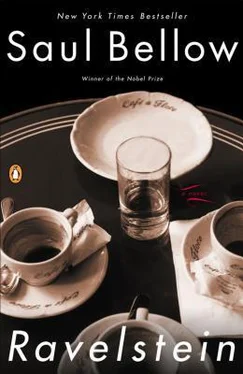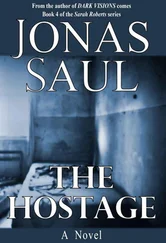One more brief vision, for purposes of orientation.
Vela figures in this one.
So here are the two of us on exhibit for all the world to judge. Her open, elegant hand directs attention to my uneasy posture.
She and I find ourselves in this scenario standing before the polished stone wall of a bank interior-an investment bank. On this occasion we were again on the outs. But I had come to the bank to meet at her request. She was escorted by a Spanish-looking and very elegant man in his mid-to late-twenties. A third man was present as well, a banker who spoke in French. Before us, set into the glamorous marble wall, were two coins. One a U. S. dime, the other a silver dollar with a diameter often or twelve feet.
Vela introduced me to the Spanish companion. It wasn't much of an introduction, since he did not acknowledge me. She then said, explaining simply, "Until now I never had any experience of glamorous sex before, and I figured, in what you always call the sexual revolution, I should have a sample of it-to find out for once what I was deprived of with you."
I said, "It's like a huge rabbit hutch, millions of rabbits, with the does sampling all the buck rabbits."
But this first phase of the meeting was quickly behind us. Its purpose, evidently, was to fill me with guilt and inject me with a mental solvent or softener.
"Can you tell me where we are?" I asked. "And why we are meeting here in front of these coins? They signify-what?"
Then the banker came forward and said that over a period of years the dime on the right would turn into the dollar with the ten-foot diameter.
"How long will it take?"
"A century or a little more."
"Well, I don't doubt the arithmetic is right-but for whom would this be done?"
"For yourself," said Vela.
"Me? And how do you figure?"
"Through cryonics," she said. "A person lets himself be frozen and stored. A century later they thaw him or her back to life. Don't you remember that we read in a tabloid how Howard Hughes had himself frozen and would be thawed and revived when they found a cure for the disease which was killing him? This is called cryonics."
"Let's hear what you want me to do. Guesswork is no use. What have you got in mind-when would you like me frozen?"
"You'd do it now. I'd go later. Then we'd wake up together in the twenty-second century."
The gray glow and the high polish of the marble slabs were calculated to persuade anybody of eternal dollar stability. But it was also the facade of a cold-storage plant-or crypt. This was foolish, perhaps. Your body would be stacked with other investors behind the marble facade. You would lie in a lab with technician-priests who tended you generation after generation, regulating the temperature, the moisture, and keeping tabs on your condition.
"You'd live again," Vela said. "Figure the compound interest per million. We would both live."
"Companions of old age?…"
The bank man, actually wearing a cutaway coat, said in a practiced voice, "By then the life span will be upward of two hundred years."
"It's the only chance for our marriage," Vela told me.
There was a certain Serbian grace note (B-flat A, B-flat C) at the great word "marriage."
"Oh, for Christ's sake, Vela! This is no way to approach the subject of death. To postpone it for a century solves nothing."
I must remind you that I had already died and risen again, and there was a curious distance in my mind between the old way of seeing (false) and the new way (strange but liberating).
English was not Vela's first language, and she couldn't reformulate anything because so much effort had gone into composing the formulations she put forward. All she could do was repeat what had been said. She again stated the facts as she understood them, which didn't advance the discussion.
I told her, "I can't do this."
"Why can't you do this?"
"You're asking me to commit suicide. Suicide is forbidden."
"By who is suicide forbidden?"
"It's against my religion. Jews don't commit suicide unless they lose the siege as they did at Masada, or are about to be hacked to pieces, as in the Crusades. Then they put their children to death before they kill themselves."
"You never fall back on religion except to win an argument," said Vela.
"Suppose you turn around and sue the bank, as soon as I'm frozen," I said. "And then you claim my estate because I'm dead. They can't prove that I might be thawed out and restored to life. Or do you think they'd bring me back just to win the lawsuit? The whole case argued before some judge who couldn't find his ass with both hands?"
When lawsuits were mentioned the bank's representative went pale and in a way I sympathized with him, although I wasn't well, myself, my heart having sunk so low.
"You owe me this," said Vela.
What did she mean? But it is a principle with me not to argue with irrational people. I simply shook my head and repeated, "It can't be done, it can't be, and I won't do it."
"No?"
"You don't understand what you're asking," I said.
"No?"
"You mean by the way you say it that _I __don't know what _I'm__ doing. Fair enough." I was never more out of line than when we stood together in the judge's chambers to be married. An old school friend I had invited to the wedding was greatly taken with Vela. He whispered in my ear, as the judge was looking for the marriage service in his book, "Even if this doesn't last six months, even if it's only a month, it's still worth it-with a bosom and hips and a face like hers."
Resuming the dialogue in the bank with Vela, I could hear myself saying, with the conviction of ultimate seriousness, "I adjusted myself long ago to dying a natural death, like everybody else. I've seen plenty of dying in my time, and I'm prepared for it. Maybe I've been a little too imaginative about the grave-the dampness and the cold. I've pictured it in too much detail and maybe feel a little too much-feel abnormally-for the dead. But there's not a chance in the world of convincing me to put myself in the hands of experimental science. I feel insulted by your proposition. But if you could induce me to marry you, perhaps you feel that I can also be talked into being frozen for a century."
"Yes, I do think you owe me something," said Vela, on top of what I was saying.
One of our difficulties, and a source of much misunderstanding, was that my outlook was incomprehensible to her. Dogs can understand a joke. Cats never, but never, have occasion to laugh. Vela, when others were laughing, would join in. But if cues were lacking ("This is funny"), she didn't smile. And I, when I amused a dinner table, was suspected by her of making her the butt of my jokes.
I may not have been aware, when I believed myself to be in a bank, with a small dime and a huge dollar set in polished marble, that in the real world my life was being saved. Doctors by drugs, nurses by tending me, technicians with their skills, were working to assist me. When or if I was saved, I would go on with my life.
And if it hadn't been for the article about Howard Hughes, Vela would not have suggested that being frozen for a century was a wonderful idea-that she would do lewd things with the Spanish boyfriend (by the way, he never had said so much as good morning to me) while I lay frozen, a block of ice, awaiting resuscitation or resurrection.
And I did not doubt the reality of this bank, these coins, those companions-Vela, her Spanish stud, the investment counselor, and Vela's remarks about the sexual revolution.
"That meeting in the bank you believe in," my wife, Rosamund, the real wife, later said, after I had described the moment to her. "Why would it be always the _worst__ things which appear to you so real? Sometimes I wonder if I'll ever be able to talk you out of being sadistic to yourself."
Читать дальше












